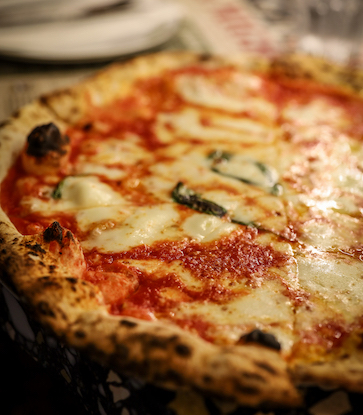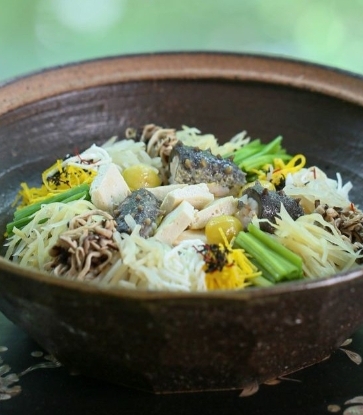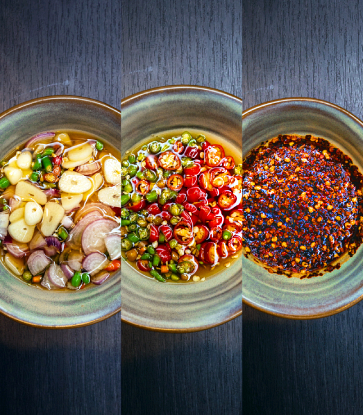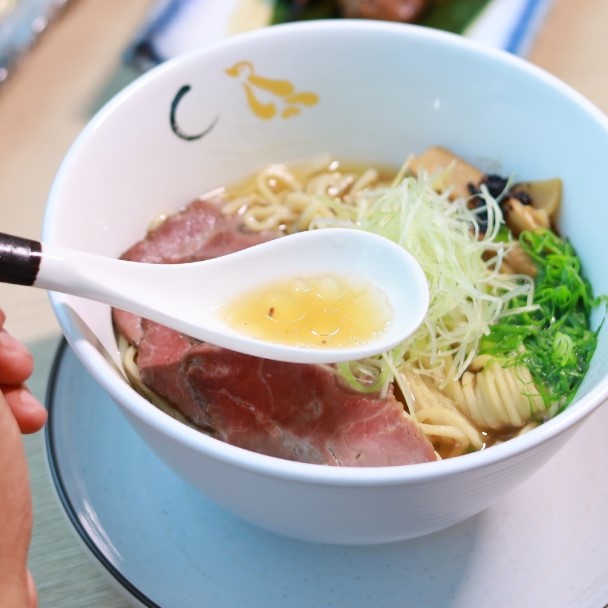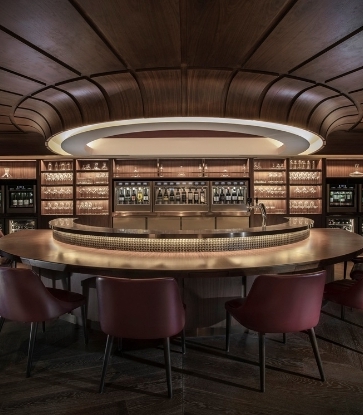Do white wines always need to be served chilled? Should you finish a bottle of wine once it's opened?
Whether you enjoy sipping wine with your meals or are delving into the intricate world of wines, Thanakorn “Jay” Bottorff—the first Thai recipient of the MICHELIN Guide Sommelier Award in the 2024 edition from the one-MICHELIN-Starred Indian restaurant INDDEE—is here to share 8 secret wine tips that experts might not have told you but that always work.

Forget the flute
"If you want to enjoy a nice bottle of champagne, a flute glass is not your only option (and, personally, it’s never my choice!). I have always preferred serving champagne in a white wine glass rather than a flute because the slightly wider bowl really enhances the aroma, revealing more depth and character. To fully appreciate a good glass of wine, you should be able to detect its full range of aromas and flavours. Personally, I enjoy exquisite champagnes like Jacques Selosse or even a glass of vintage champagne in a Burgundy glass."Find your sweet glass spot
“Each wine glass brand can offer a different taste, so find your sweet spot. Open your favourite bottle of Pinot Noir and try it in different Burgundy glasses from various brands simultaneously. You will notice how each glass affects the wine differently. Some glasses, for example, will bring out the aromas better than others. It’s not to say that there are bad wine glass brands out there, only that you need to find the perfect glass that suits the style of wine you typically enjoy. Just keep searching and enjoy—thank me later!”
Save the best for last
“I receive a lot of questions from guests who would like to open a nice bottle of wine but aren’t sure what the ideal wine to open and drink right now is. Let’s put everyday drinking wine aside for this topic and focus only on high-end wines in general. If you wish to open a nice bottle of wine and drink it right away without wasting too much time on decanting, choose a poor vintage. Poor vintage wine tends to be soft and opens much faster than great vintage wine, which tends to be very tight and needs a long time to mature before being properly consumed. This also applies to young vintage high-end wines in general, which are usually best after a decade. So, can you still open and enjoy them now? Yes, of course, but not as much as if you gave them those 10 years to mature and develop over time.”Cool some reds, warm some whites
“I’m a temperature freak when it comes to wine to such an extent that every time I see a bottle of red wine sitting on the guest’s table for too long it triggers my OCD. Most of the time, I will put the bottle in an ice bucket for a few minutes to cool it down and then put it right back on the table. But then, for example, not all white wine necessarily has to be served chilled. Most oak-dominant wines, such as White Burgundy or Chardonnay in general, tend to express much more at a warmer temperature, so I put them on, not under the ice.”
Invest in wine preservation equipment
“If you don’t mind spending a few thousand baht, Coravin will be your best investment ever. As a sommelier who runs 103 wines by the glass at INDDEE, I find Coravin to be a lifesaver. It helps to preserve wine for weeks to months. However, if you want to opt for something more affordable, there is a cheap yet highly effective way. Empty a small glass bottle and make sure it’s clean. Pour the leftover wine into the bottle until it is filled to the top without any space left for oxygen. When you close the cap of the bottle, roll it around to ensure there are no bubbles inside. If you find a single bubble, then you need to repeat the process. Once done, you can keep it in the fridge for weeks!”Know these before buying wine at a store
“Make sure the establishment you are going to doesn't seem sketchy about how they store their wines. Temperature is key, particularly in Thailand, where the hot climate can spoil wine quickly. If you go to a wine shop or bar and notice that the wine is not kept in a proper temperature-controlled room, you might face some risk. However, I do know many shops and bars that don’t have a wine storage room, but they keep their air conditioning on 24/7 just to maintain a cool environment, which is also a good alternative. Lastly, keep exploring. Don’t be afraid to ask the salesperson or sommelier of the establishment about the style of wine you usually like, and request alternative recommendations or anything they think you should try. In this way, you can expand your portfolio and truly enjoy the wine world.”
Big, bold reds might not be ideal for pairing with Thai and Asian cuisine
“For Thai food pairing, I always avoid heavy or full-bodied reds. Tannins in red wine tend to make an already spicy dish spicier, and the richness of the wine tends to cover up the real flavour of the dish. Thai food, in general, is flavourful. Some dishes can be rich and intense, while others can be light and delicate.“I usually go for acidic whites or sparkling wines with a touch of oak or none at all. For rich dishes, I choose light to medium acidic reds. I find that I really like the acidity in wine when it comes to Asian food. It helps to clean your palate when paired with rich and creamy dishes, and it integrates perfectly. It plays an important role in the pairings I do with Asian food. On the other hand, I sometimes like the sweet touch of wine. But it has to be very mild, and I tend not to overuse it in my pairings. When there’s too much sweetness in a pairing with spicy dishes, it tends to contrast too strongly and can destroy the identity of the dish.”
Don’t be shy, ask a sommelier
“Firstly, if you’d like to open a premium wine, let us prepare for you. If you plan to celebrate your night at a restaurant, a sommelier would love to get that information in advance, possibly a day before your arrival. Premium wines in general require certain preparations to maximise their full experience. Some need hours of decanting to let them breathe, some need to be opened in a specific timeline and sometimes, if we know the guest doesn’t like sediment, we can help filter out the sediment and rebottle it back for them. This doesn’t appeal only to red or white wine. High-quality champagne also requires similar treatment.“Secondly, your wine preference is very important to us in providing the best experience. Don’t be afraid to ask for our help! I always like to ask our guests many questions, such as: Do you like acidity in the wine? What kind of texture do you prefer? Do you like something more on the mineral or aromatic side? I promise you it’s not an investigation, but rather collecting pieces of a puzzle to find the exact wine that could make your night memorable!
“Last but not least, feel free to let us know how much you would like to spend on wine. I have heard a lot of people say that asking guests ‘how much they feel comfortable spending on wine’ is inappropriate. But for me, the whole purpose of a great restaurant or wine bar is to make our guests leave happy, without feeling ripped off.”
Illustration image: © Shutterstock



